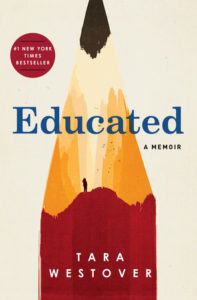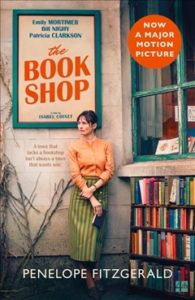 Tara Westover was brought up in fundamentalist Mormon family in Bucks Peak, Idaho. Her memoir follows her childhood, her struggles with her domineering father and violent brother and the existential internal conflict she experiences in trying to break free of her background. From the outside, what happens to Tara appears a sort of brainwashing, from the inside, she feels she is in a loving family (she has a sister and five brothers) who follow the precepts of a loving God through the teachings of Joseph Smith. Westover does convincingly bring us into this family– they are isolated and close knit and live in a beautiful valley beneath the picturesque peak. When she was young her father joked and laughed, although he believed they were in the end of days, so he prepared stockpiles of food, fuel and guns. Her mother fulfilled the compliant role allotted to her, and made herbal remedies (for some reason the father felt that the medical establishment was evil).
Tara Westover was brought up in fundamentalist Mormon family in Bucks Peak, Idaho. Her memoir follows her childhood, her struggles with her domineering father and violent brother and the existential internal conflict she experiences in trying to break free of her background. From the outside, what happens to Tara appears a sort of brainwashing, from the inside, she feels she is in a loving family (she has a sister and five brothers) who follow the precepts of a loving God through the teachings of Joseph Smith. Westover does convincingly bring us into this family– they are isolated and close knit and live in a beautiful valley beneath the picturesque peak. When she was young her father joked and laughed, although he believed they were in the end of days, so he prepared stockpiles of food, fuel and guns. Her mother fulfilled the compliant role allotted to her, and made herbal remedies (for some reason the father felt that the medical establishment was evil).
As Tara grew up however, things became more extreme. Along with his suspicion of doctors, the father also thought schools were a thought control tool of the government, so the kids were home schooled, if they were schooled at all. The boys were supposed to work in the father’s scrapping, junkyard business. And when the father needed more labour, Tara, also was forced to work there. It was hard, dirty and dangerous and she was only eleven. The utter hypocrisy of the father doesn’t seem to dawn on Tara (the older sons are allowed to go away to earn their living trucking because they will have to support families, the role of women is to be mothers, yet the father forces Tara to labour in the junk yard).
A number of gruesome accidents provide the turning points in the narrative. Tara’s brother, Luke, is horrendously burned on the legs in a welding accident on the property and the father dumps him on eleven-year-old Tara to administer medical care, while he puts out the resulting brush fire. Every time someone is in extreme pain, the mother gives a tincture of skullcap and lobelia–Tara, herself, admits this provided no obvious relief. The next accident is to her older brother, Shawn, resulting in a head injury. This exacerbates an earlier injury caused when the father drove their van thought the night in a snowstorm and caused it to roll (the mother was also injured in this accident causing possible brain damage which might or might not explain her later belief that she had special powers from God to heal). The utter, helpless, compliance of the family is illustrated in the fact that a couple of years later, the father insists yet again they drive through the night in bad weather forcing his son Luke to do the driving, although he has worked all day and is tired – ‘the angels will fly with us’ the father says. Yep. Another accident, more injures to the family and Luke takes all the guilt on himself.
The immense pull of this book is the hard-to-accept fact that for all the father’s selfishness, unquestioning and unquestionable zealous faith in an Old Testament God, and his utter disregard for his children’s physical well-being – they all come back time and time again to live under their father’s tyrannical rule and, this is the unbelievable part, profess to love him. Because Tara herself makes excuse after excuse, turns blind eye after blind eye, the reader is left to feel the rage towards this repugnant, unhinged man that, really, she should have felt. However, it is not the father’s actions themselves that provide the final straw for Tara but, rather, her brother Shawn’s violent behaviour. Perhaps this too can be sheeted home to the father as Shawn was the victim of head injuries caused by the total lack of any safety procedures in the junkyard, and the father’s prohibition on seeking any medical help. Shawn’s sick violence and misogyny is directed at Tara once she reaches puberty. The mother pretends not to see these awful acts of harm to her own daughter.
I won’t spoil it by revealing how Tara gets out of it, but it is a long time coming, and by the time it arrives, for this reader, it was way too late. If you have ever wondered why women stay in violent relationships, this quite remarkable book takes you to that dark place. I was often frustrated at Tara (and her mother) but Westover brought me to the inside and made me see it from her point of view. Quite simply, you just cannot put this book down. It is one of the most compelling things I’ve ever read. I guess the reader is ‘educated’, as well.




